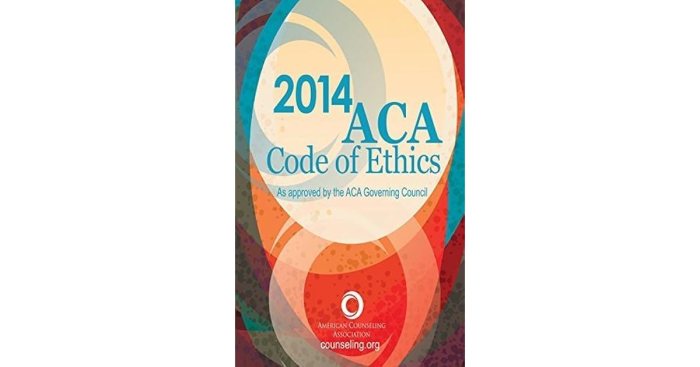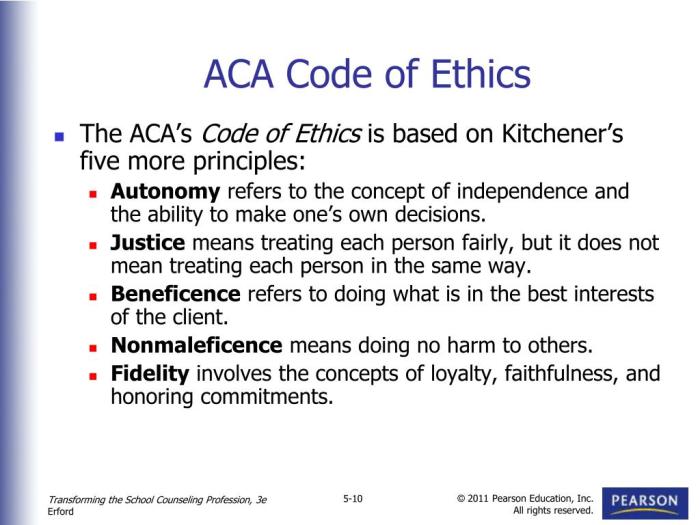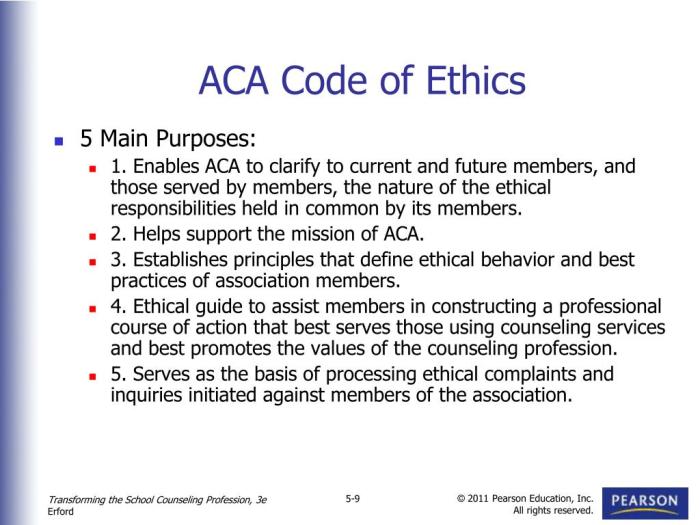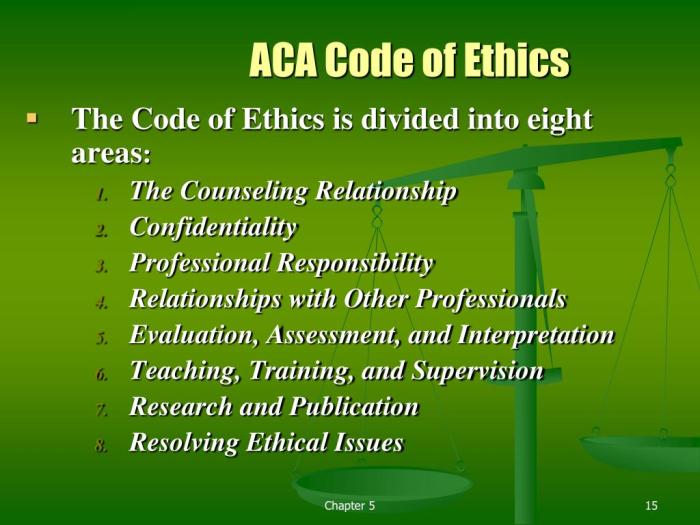The ACA 2014 Code of Ethics is a comprehensive set of guidelines that provides ethical standards for counselors in various settings. It is essential for counselors to understand and adhere to these ethical principles to ensure the well-being of their clients and maintain the integrity of the profession.
This guide will provide an overview of the ACA 2014 Code of Ethics, including its purpose, scope, key principles, and ethical standards for counselors. It will also discuss the ethical responsibilities of counselors to clients, colleagues, the profession, and the public, as well as the process for ethical enforcement and discipline.
Overview of the ACA 2014 Code of Ethics

The ACA 2014 Code of Ethics serves as a comprehensive set of guidelines for ethical behavior among counseling professionals. It provides a framework for responsible and ethical practices in the counseling field, ensuring the well-being of clients and maintaining the integrity of the profession.
The Code’s development involved extensive research, consultation with experts, and input from various stakeholders in the counseling community. It reflects the evolving ethical challenges faced by counselors and aims to provide clear and practical guidance for ethical decision-making.
As we explore the intricacies of the ACA 2014 Code of Ethics, we can draw parallels to the moral dilemmas faced in “The Crucible.” In Act 3 of the play, the crucible act 3 pdf reveals the consequences of mass hysteria and the erosion of ethical values.
The play serves as a cautionary tale, reminding us of the importance of upholding the principles outlined in the ACA 2014 Code of Ethics, ensuring the integrity of our profession and the well-being of those we serve.
Key Principles Underlying the Code
The ACA 2014 Code of Ethics is founded on several fundamental principles that guide counselors in their ethical conduct:
- Respect for the Dignity and Worth of the Person:Counselors must respect the inherent dignity and worth of every individual, regardless of their background or characteristics.
- Confidentiality and Privacy:Counselors must maintain the confidentiality of client information, except in situations where disclosure is legally or ethically required.
- Competence:Counselors must practice within the boundaries of their competence and seek appropriate supervision or consultation when necessary.
- Responsibility to Clients:Counselors must prioritize the well-being of their clients and act in their best interests.
- Integrity:Counselors must maintain high ethical standards and avoid conflicts of interest or other situations that may compromise their objectivity.
Ethical Standards for Counselors

Ethical standards serve as a guiding framework for counselors in various settings, ensuring responsible and ethical conduct in their professional practice. These standards encompass a comprehensive set of principles and guidelines that address counselor behavior, relationships, and responsibilities.
Ethical Decision-Making Process for Counselors
Counselors engage in an ethical decision-making process to navigate complex ethical dilemmas. This process typically involves:
- Identifying the ethical issues involved.
- Examining relevant ethical codes and guidelines.
- Considering the potential impact of decisions on clients, colleagues, and the profession.
- Consulting with supervisors, colleagues, or ethics committees.
- Making a decision that aligns with ethical principles and best practices.
Ethical Dilemmas Faced by Counselors
Counselors may encounter a range of ethical dilemmas in their practice, including:
- Confidentiality and privacy issues.
- Dual relationships with clients.
- Conflicts of interest.
- Cultural and diversity considerations.
- Professional boundaries.
- Responding to client crises.
Ethical Responsibilities to Clients

Counselors have a profound ethical responsibility to safeguard the well-being of their clients. This responsibility encompasses a range of ethical considerations, including maintaining confidentiality, obtaining informed consent, and avoiding dual relationships.
Confidentiality
Confidentiality is the cornerstone of the counselor-client relationship. Counselors must protect the privacy of their clients and keep their communications confidential. This includes not disclosing any information about the client’s identity, personal history, or treatment without their explicit consent.
There are some exceptions to the rule of confidentiality, such as when the client poses a danger to themselves or others, or when there is a legal obligation to report certain information. However, counselors should only disclose information when absolutely necessary and should take steps to minimize the potential harm to the client.
Informed Consent
Informed consent is the process of ensuring that clients understand the nature of the counseling relationship and the services that will be provided. Counselors must provide clients with clear and concise information about the following:
- The purpose of counseling
- The techniques that will be used
- The potential benefits and risks of counseling
- The counselor’s fees
- The client’s rights and responsibilities
Clients must be given the opportunity to ask questions and make informed decisions about whether or not to participate in counseling.
Dual Relationships
Dual relationships occur when a counselor has a personal or professional relationship with a client outside of the counseling setting. These relationships can create a conflict of interest and can compromise the objectivity and effectiveness of the counseling process.
Counselors should avoid entering into dual relationships with clients. If a dual relationship is unavoidable, counselors must take steps to manage the potential conflict of interest and ensure that the client’s well-being is not compromised.
Ethical Responsibilities to Colleagues and the Profession

Counselors have ethical responsibilities not only to their clients but also to their colleagues and the profession as a whole. These responsibilities include maintaining professional boundaries, respecting the privacy of colleagues, and contributing to the advancement of the profession.
Supervision, Consultation, and Collaboration
Counselors are responsible for seeking supervision and consultation when needed to ensure the quality of their services. They must also respect the confidentiality of colleagues and clients during supervision and consultation. When collaborating with other professionals, counselors must maintain professional boundaries and avoid conflicts of interest.
Addressing Ethical Issues, Aca 2014 code of ethics
Ethical issues can arise in professional relationships between counselors. When such issues arise, counselors should address them promptly and professionally. This may involve discussing the issue directly with the colleague involved, seeking guidance from a supervisor or professional organization, or reporting the issue to the appropriate authorities.
Ethical Responsibilities to the Public: Aca 2014 Code Of Ethics
Counselors have ethical responsibilities to the public that extend beyond their work with individual clients. These responsibilities include:
- Advocacy:Counselors are expected to advocate for the rights and well-being of all people, regardless of their race, ethnicity, gender, sexual orientation, disability, or socioeconomic status.
- Social Justice:Counselors are committed to promoting social justice and equity. They work to eliminate discrimination and oppression and to create a more just and inclusive society.
- Public Education:Counselors have a responsibility to educate the public about mental health and well-being. They provide information about mental health conditions, treatment options, and resources.
Working with the Media and Other Public Audiences
When working with the media or other public audiences, counselors must be mindful of the ethical considerations involved. These considerations include:
- Confidentiality:Counselors must protect the confidentiality of their clients, even when speaking to the media.
- Accuracy:Counselors must be accurate and truthful in their statements to the media.
- Objectivity:Counselors must avoid expressing personal opinions or biases when speaking to the media.
Addressing Ethical Issues in Public Settings
Counselors may encounter ethical issues when working in public settings, such as schools, hospitals, or community agencies. These issues may include:
- Conflicts of Interest:Counselors must avoid conflicts of interest that could compromise their ability to provide objective and ethical services.
- Dual Relationships:Counselors must avoid dual relationships with clients that could impair their professional judgment.
- Mandatory Reporting:Counselors are required to report certain types of information, such as child abuse or neglect, to the appropriate authorities.
Counselors should be familiar with the ethical guidelines that apply to their work in public settings and should seek guidance from their supervisors or professional organizations when faced with ethical dilemmas.
Ethical Enforcement and Discipline

The ACA has established a comprehensive process for ethical enforcement and discipline to ensure that counselors adhere to the ethical principles Artikeld in the Code of Ethics.The ACA Ethics Committee plays a crucial role in enforcing the Code of Ethics.
The committee is responsible for reviewing and investigating complaints against counselors, determining whether there has been a violation of the Code, and imposing appropriate disciplinary actions.
Process for Ethical Enforcement and Discipline
The ethical enforcement and discipline process typically involves the following steps:
- Filing a Complaint:Individuals can file ethical complaints against counselors by submitting a written complaint to the ACA Ethics Committee.
- Review of Complaint:The Ethics Committee reviews the complaint to determine if it falls within the jurisdiction of the ACA and if there is sufficient evidence to proceed with an investigation.
- Investigation:If the complaint is deemed valid, the Ethics Committee will conduct an investigation, which may include gathering evidence, interviewing witnesses, and obtaining statements from the counselor.
- Determination of Violation:After completing the investigation, the Ethics Committee will determine whether the counselor has violated the Code of Ethics.
- Disciplinary Action:If a violation is found, the Ethics Committee may impose disciplinary actions, which can range from a written reprimand to expulsion from the ACA.
Responding to Ethical Complaints and Investigations
Counselors who are the subject of ethical complaints or investigations should respond promptly and professionally. Here are some guidelines:
- Cooperate with the Investigation:Counselors should cooperate fully with the Ethics Committee’s investigation and provide all relevant information and documentation.
- Obtain Legal Counsel:Counselors may consider obtaining legal counsel to assist them in navigating the ethical enforcement and discipline process.
- Document Interactions:Counselors should document all interactions with the Ethics Committee, including phone calls, emails, and meetings.
- Respect the Process:Counselors should respect the ethical enforcement and discipline process and refrain from engaging in retaliatory or obstructive behavior.
Quick FAQs
What are the key principles underlying the ACA 2014 Code of Ethics?
The key principles underlying the ACA 2014 Code of Ethics include beneficence, nonmaleficence, autonomy, justice, and fidelity.
What are the ethical responsibilities of counselors to clients?
Counselors have ethical responsibilities to clients, including confidentiality, informed consent, dual relationships, and working with diverse clients.
What is the process for ethical enforcement and discipline within the ACA?
The process for ethical enforcement and discipline within the ACA involves the ACA Ethics Committee, which investigates ethical complaints and may impose sanctions on counselors who violate the Code of Ethics.